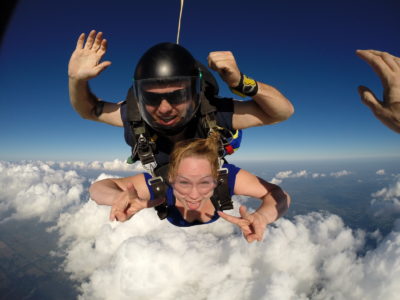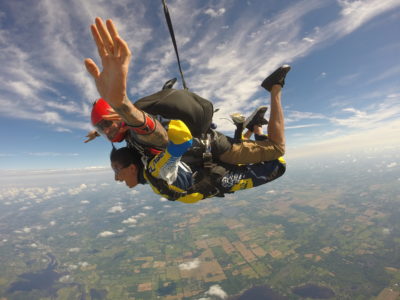- Michigan's Premier Skydiving Center
- Call Now: (517) 423-7720
Medical Conditions That Prevent Skydiving
Thursday, November 30, 2023
- Skydive Tecumseh
- 11/30/23
- 0
- General
Skydiving, like any extreme sport, is an activity of risk vs. reward. There’s a lot to think about when it comes to deciding to jump out of an airplane, and skydiving health restrictions are an important piece of the puzzle. Understanding medical conditions that prevent skydiving can help you decide if it’s safe for you to jump.
Whether it’s skydiving with a heart condition, neck or back issues, pregnancy, or other skydiving health risks and considerations, it’s important to take the time to do some research before committing to a tandem skydive. Skydiving is a high-adrenaline activity that requires active participation. While the sport is accessible to most individuals, there are certain medical conditions that pose too much risk.
Practicing self-awareness and having a full understanding of skydiving medical restrictions can take a lot of the stress out of jumping with a medical condition. Here we’ll break down different health risks and medical concerns and how they may impact your skydiving experience.
Medical Conditions and Skydiving
Having a medical condition doesn’t automatically disqualify you from going skydiving. There are plenty of ways to work around different medical issues, and many licensed skydivers have thousands of successful jumps under their belt despite living with various medical conditions.
But skydiving is a physical sport, and even tandem skydives require a certain amount of mobility and physical fitness. A tandem skydive is more than just a carnival ride. You’ll find yourself in various physical positions throughout the course of your skydive, and your instructor will need you to assist in different phases of the jump.
There’s also the adrenaline aspect of skydiving that could pose a risk to people with certain medical conditions. The emotional response people have to exit an airplane mid-flight puts additional stress on the heart, lungs, and brain, so it’s important that all of these systems are healthy enough to handle the extra load.
Some medical conditions that could prevent you from going skydiving include:
- Weight
- Cardiovascular conditions
- Neck/back injuries
- Pregnancy
- Diabetes
- Epilepsy/seizure disorders
- Asthma/respiratory Issues
Skydiving Health & Medical Restrictions
Skydiving with a Heart Condition
One of the most common concerns people have around skydiving and their health has to do with the heart. While our hearts are the part most easily captured by skydiving, they’re also the organs most impacted by stress and increased cortisol levels. And jumping out of an airplane certainly packs a punch.
Congenital heart disease, arrhythmia, and other cardiovascular issues can pose a risk in the high-stress, low-oxygen, pressure-changing environment of skydiving. The conditions that come with skydiving are textbook risks for people with heart problems.
But what about blood pressure? Can people with high BP do skydiving? The answer to that is the same as any other heart condition. Heart conditions come with a wide array of prognoses, and some are safer to jump with than others. It all depends on the severity, and it’s best to consult with a medical professional before taking the leap.
Neck or Back Issues
Another common question people have about skydiving is how it will impact neck or back issues. Your spine is one of the most important parts of your body, and compromising it can come with serious consequences. It makes sense to worry about what issues an activity as intense as skydiving could cause.
A lot of skydiving is smooth and soft. The cruise to altitude, floaty freefall, gliding through the air under the parachute – all of these things evoke weightlessness. But there are also parts of the jump that can get a little bumpy. When the parachute opens, you’ll be slowing down from 120 mph to 20 mph, and all of that force moves through your body. You also have to land, which puts slightly more stress on your skeleton than regular day-to-day activity.
Any of these things could send a shock through an already compromised back or neck that could result in additional damage. Even things that wouldn’t bother someone with a healthy spine could pose a potential risk if you have been injured previously.
In addition to being susceptible to further injury, existing neck or spine problems can actually hinder your ability to safely participate in the skydive. The most important position you will assume on your skydive requires a consistent arch in your back, and that can be difficult to hold if you have spinal issues. The arch position is what keeps you stable in freefall and helps your instructor fly safely, so not being able to arch properly can cause real problems in the air.
As with any medical concern, it’s imperative to talk to your doctor and do some research before jumping out of an airplane with neck or back issues.
Pregnancy and Skydiving
Getting pregnant means hitting the pause button on a lot of things. With the physiological changes that occur during pregnancy and the need to keep the growing baby safe, there are certain activities that have to be put on hold until after the baby is born. And while some experienced skydivers choose to continue jumping at the beginning of their pregnancy, it’s not safe to make a first tandem jump while you’re expecting.
And it’s not just the baby we’re worried about. The body releases the hormones progesterone and relaxin during pregnancy, which serve to relax the muscles and tendons and reduce musculoskeletal cohesion. How else is that baby supposed to fit in there for nine months??
These changes to the body mean that the person carrying the baby is at increased risk for injury, especially with the forces that skydiving puts on the joints. But just imagine how much fun it will be to celebrate the birth of your new child with a skydive!
Diabetes and Skydiving
 You might be wondering, “Why can’t you skydive if you have diabetes?” And you would be right to ask that question because it’s not actually that simple. It is possible to skydive with diabetes as long as certain conditions are met.
You might be wondering, “Why can’t you skydive if you have diabetes?” And you would be right to ask that question because it’s not actually that simple. It is possible to skydive with diabetes as long as certain conditions are met.
There are plenty of new and experienced skydivers who enjoy jumping out of airplanes. Diabetes is a medical condition that requires consistent attention and maintenance. And there are ways to stay safe while doing extreme activities like skydiving.
People who have their diabetes under control with exercise, diet, and medication can use their understanding of diabetes to keep it in check while participating in skydiving. Depending on the severity, you can even bring a small snack or your glucose monitor in the plane with you. Just be sure to talk to your instructor beforehand so they can help you do it safely.
As with anything, talking to your doctor about your condition before going skydiving is a must. The only way to keep yourself safe is to stay informed.
Respiratory Concerns
Skydiving is all about the altitude. And the higher you go, the thinner the air gets. Less oxygen in the air poses an obvious problem for people with breathing issues, such as asthma, emphysema, COPD, and chronic bronchitis.
If you experience respiratory problems or have a medical condition that affects your breathing on the ground, chances are it’s going to be worse at higher altitudes. Stress also impacts breathing, so coupling the higher altitude with the increased respiration that often comes with adrenaline-rich activities can be dangerous to someone with respiratory concerns.
So can someone with asthma go skydiving? Can people with COPD go skydiving? It is possible as long as certain conditions are met. If your condition is under control, it may not be an issue at all during your skydive. But it’s important to consult your physician before deciding whether or not it’s safe for you to make a jump.
Pressure changes can also be problematic for people who have sinus issues, pneumothorax, or a collapsed lung. Even if you just have a bad cold, the congestion can cause pain or a burst eardrum with the pressure changes that happen on a skydive.
Your safety and comfort is the number one priority when it comes to jumping out of airplanes. And that goes beyond the safety measures taken by our staff. Your physical health is just as important as any other consideration that goes into deciding to skydive.
While our blog is a helpful guide, it’s always crucial to seek personalized medical advice if you’re unsure about your ability to skydive. Reach out to us if you have any questions about skydiving, the process, or our approach to jumping! And if you’re ready to jump, we’re ready to show you the sky!
Copyright © 2025, Skydive Tecumseh, All Rights Reserved.
DropZone Web Design & Marketing by Beyond Marketing, LLC

